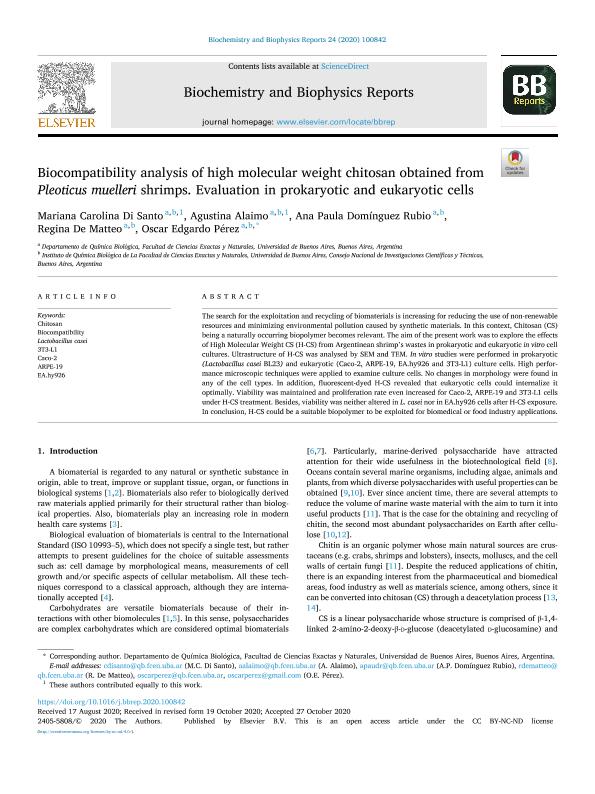Artículo
Biocompatibility analysis of high molecular weight chitosan obtained from Pleoticus muelleri shrimps: Evaluation in prokaryotic and eukaryotic cells
Di Santo, Mariana Carolina ; Alaimo, Agustina
; Alaimo, Agustina ; Domínguez Rubio, Ana Paula
; Domínguez Rubio, Ana Paula ; de Matteo, Regina
; de Matteo, Regina ; Perez, Oscar Edgardo
; Perez, Oscar Edgardo
 ; Alaimo, Agustina
; Alaimo, Agustina ; Domínguez Rubio, Ana Paula
; Domínguez Rubio, Ana Paula ; de Matteo, Regina
; de Matteo, Regina ; Perez, Oscar Edgardo
; Perez, Oscar Edgardo
Fecha de publicación:
12/2020
Editorial:
Elsevier
Revista:
Biochemistry and Biophysics Reports
ISSN:
2405-5808
Idioma:
Inglés
Tipo de recurso:
Artículo publicado
Clasificación temática:
Resumen
The search for the exploitation and recycling of biomaterials is increasing for reducing the use of non-renewable resources and minimizing environmental pollution caused by synthetic materials. In this context, Chitosan (CS) being a naturally occurring biopolymer becomes relevant. The aim of the present work was to explore the effects of High Molecular Weight CS (H-CS) from Argentinean shrimp's wastes in prokaryotic and eukaryotic in vitro cell cultures. Ultrastructure of H-CS was analysed by SEM and TEM. In vitro studies were performed in prokaryotic (Lactobacillus casei BL23) and eukaryotic (Caco-2, ARPE-19, EA.hy926 and 3T3-L1) culture cells. High performance microscopic techniques were applied to examine culture cells. No changes in morphology were found in any of the cell types. In addition, fluorescent-dyed H-CS revealed that eukaryotic cells could internalize it optimally. Viability was maintained and proliferation rate even increased for Caco-2, ARPE-19 and 3T3-L1 cells under H-CS treatment. Besides, viability was neither altered in L. casei nor in EA.hy926 cells after H-CS exposure. In conclusion, H-CS could be a suitable biopolymer to be exploited for biomedical or food industry applications.
Palabras clave:
3T3-L1
,
ARPE-19
,
BIOCOMPATIBILITY
,
CACO-2
,
CHITOSAN
,
EA.HY926
,
LACTOBACILLUS CASEI
Archivos asociados
Licencia
Identificadores
Colecciones
Articulos(IQUIBICEN)
Articulos de INSTITUTO DE QUIMICA BIOLOGICA DE LA FACULTAD DE CS. EXACTAS Y NATURALES
Articulos de INSTITUTO DE QUIMICA BIOLOGICA DE LA FACULTAD DE CS. EXACTAS Y NATURALES
Citación
Di Santo, Mariana Carolina; Alaimo, Agustina; Domínguez Rubio, Ana Paula; de Matteo, Regina; Perez, Oscar Edgardo; Biocompatibility analysis of high molecular weight chitosan obtained from Pleoticus muelleri shrimps: Evaluation in prokaryotic and eukaryotic cells; Elsevier; Biochemistry and Biophysics Reports; 24; 12-2020; 100842-100852
Compartir
Altmétricas



